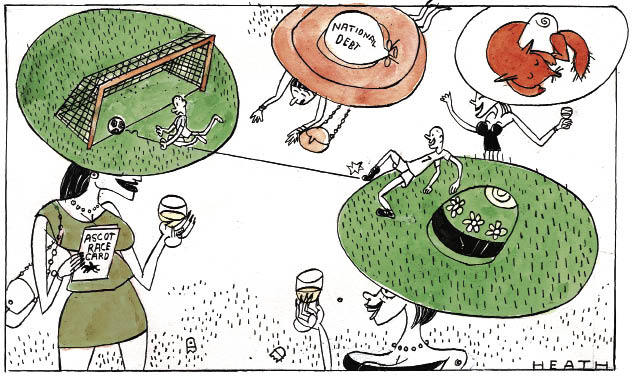The Office for Budget Responsibil-ity (OBR) forecast that gross domestic product would grow by 2.6 per cent in 2011, compared with the 3.25 per cent predicted by the previous government. But the deficit and inflation would nonetheless fall faster than predicted. ‘This is our best shot at an impossible task,’ said Sir Alan Budd, the head of the OBR. The government is to make an emergency Budget on 22 June. The OBR also said that the cost to the taxpayer of public sector pensions will rise from £4 billion a year now to £9 billion by 2014-15. Mr Nick Clegg, the deputy Prime Minister said: ‘It’s not affordable.’ The annual rate of inflation measured by the Consumer Prices Index fell to 3.4 in May from 3.7 per cent in April; the rate measured by the Retail Prices Index fell to 5.1 per cent from 5.4 per cent. Unemployment rose by 23,000 to 2.47 million, a lower increase than expected for the fourth consecutive month. Mr George Osborne, the Chancellor of the Exchequer, in his Mansion House speech, signalled a shift of regulatory power to the Bank of England. The setting up of a vetting and barring scheme for nine million people working with children in England, Wales and Northern Ireland was halted by Mrs Theresa May, Home Secretary, as ‘draconian’. Air Chief Marshal Sir Jock Stirrup is to retire as chief of the defence staff in the autumn, a year early. Egon Ronay, the food critic, died, aged 94. Teresa Cuthbertson, known as Baby Jungman when she was a Bright Young Thing, died, aged 102. Goldikova won the Queen Anne Stakes by a neck from Paco Boy on the first day of Royal Ascot.
After 12 years, the Saville inquiry published a 5,000-page report on the shooting dead of 13 people in Londonderry on Sunday 30 January, 1972. The inquiry cost £195 million. It found that none of the killed or wounded was armed with a firearm; that, though there was firing by republican paramilitaries, on balance, the soldiers fired first; that Mr Martin McGuinness, at that time an officer of the Provisional Irish Republican Army, was probably armed with a Thompson sub-machine gun; that none of the soldiers aimed at people posing a threat of causing death or serious injury; that no evidence was found of toleration by the British government of a shoot-to-kill policy. ‘I never want to call into question the behaviour of our soldiers,’ Mr David Cameron, the Prime Minister, said in a statement to Parliament, before declaring: ‘On behalf of our country, I am deeply sorry.’ Mr Nick Griffin, the leader of the British National Party, was invited to a garden party at Buckingham Palace because he is an MEP. The BBC received hundreds of complaints about the noise of plastic vuvuzela horns being sounded throughout televised World Cup matches.
President Barack Obama of the United States made a televised speech on the oil leak in the Gulf of Mexico, which he said was ‘assaulting our shores and our citizens’. ‘We will make BP pay,’ he said. Democrats in Congress asked BP to put $20 billion into as fund to compensate those affected. The US Coast Guard estimated that the leak, which began on 20 April, was allowing about 35,000 barrels to escape a day, with BP estimating the amount they were collecting at 15,000 barrels a day. Earlier Mr Obama had said: ‘In the same way that our view of our vulnerabilities and our foreign policy was shaped profoundly by 9/11, I think this disaster is going to shape how we think about the environment and energy.’ Mr Obama spoke to Mr Cameron on the telephone. Mr Obama then met the chairman of BP and asked the company not to pay a dividend to shareholders this year. Fitch degraded BP’s credit rating six steps from AA to BBB. Moody’s degraded Greek government bonds four steps from A3 to the junk status of Ba1. France is to raise its retirement age from 60 to 62. Spanish unions called a general strike for 29 September, Michaelmas.
More than a quarter of a million people fled ethnic fighting in southern Kyrgyzstan, according to the UNHCR, with 75,000 ethnic Uzbeks fleeing to neighbouring Uzbekistan. At least 170 died in violence in the cities of Osh and Jalalabad. The Nobel peace prize laureate Lord Trimble was named as one of two foreign observers at an inquiry into the killing of nine Turkish activists when troops stormed a ship bound for Gaza on 31 May. At Mazatlan jail in the state of Sinaloa, Mexico, members of a drug gang armed with guns forced their way into a block holding prisoners from a rival gang and shot 18 dead, while another 11 were stabbed to death. The Hayabusa space capsule, launched in 2003 to collect dust from the ancient Itokawa asteroid in 2005, landed again at the Woomera Prohibited Area, Australia. CSH






Comments